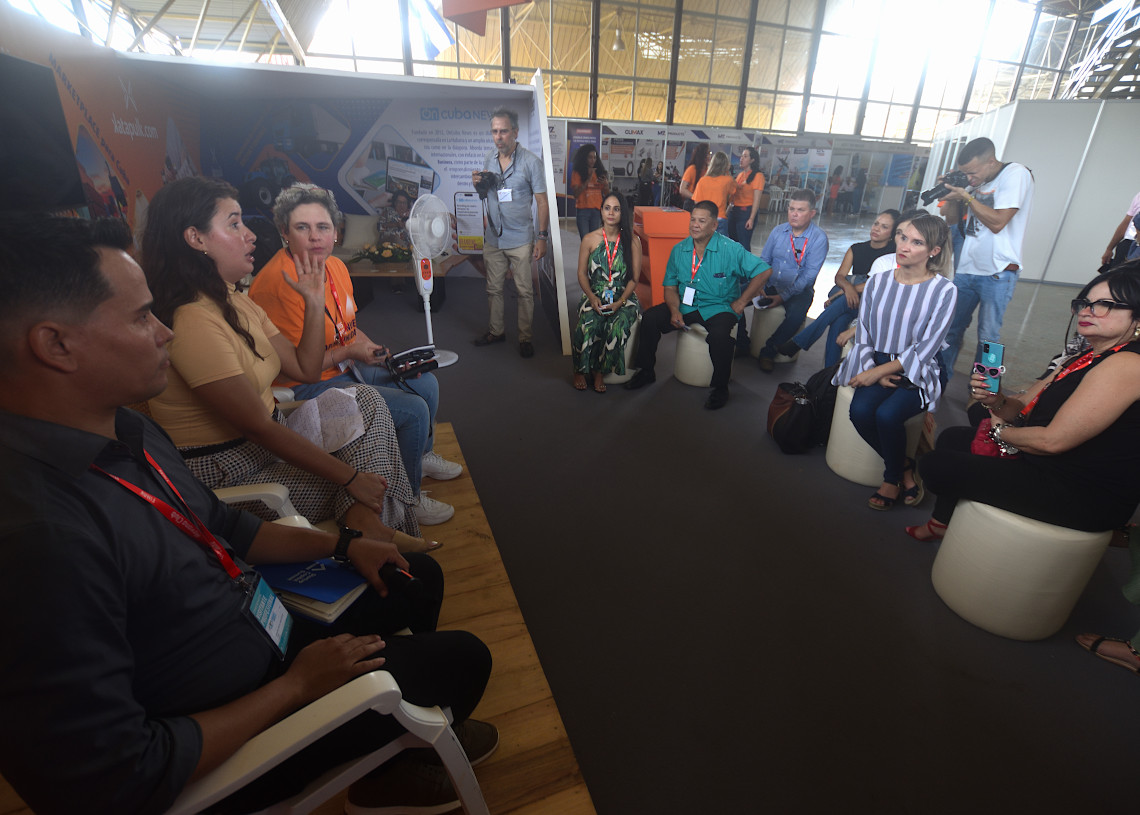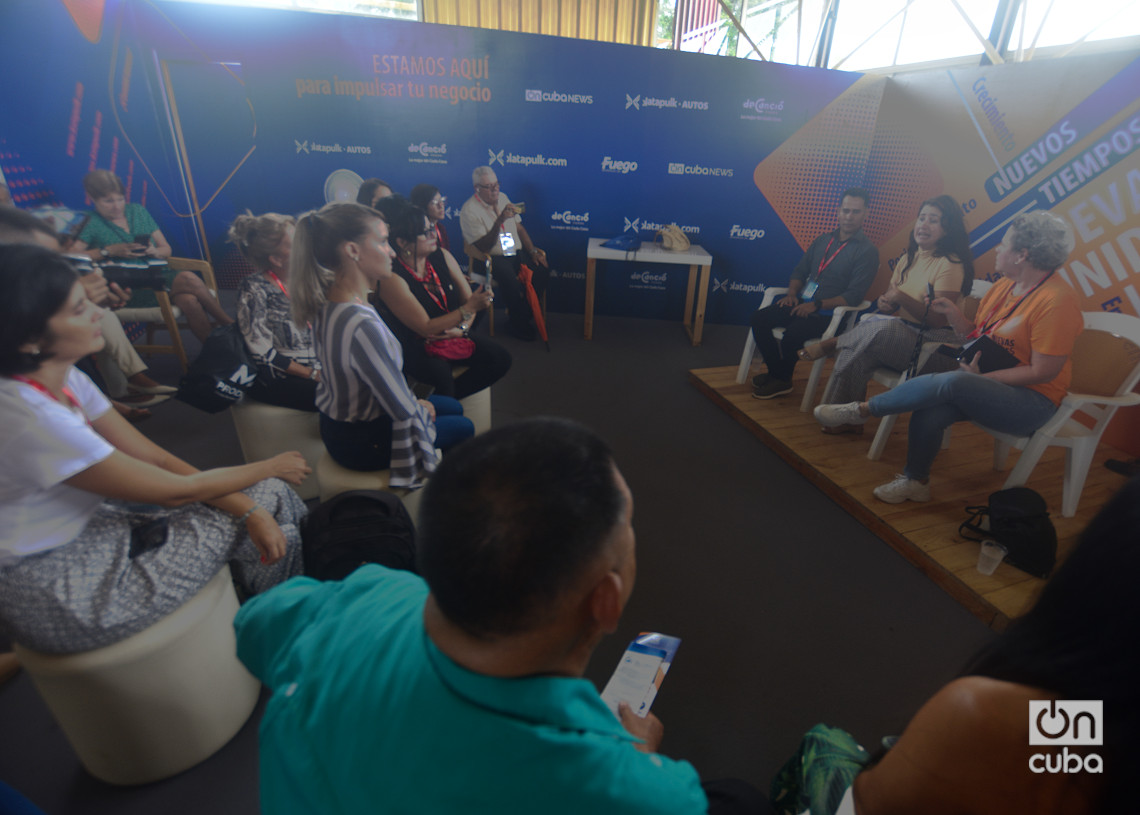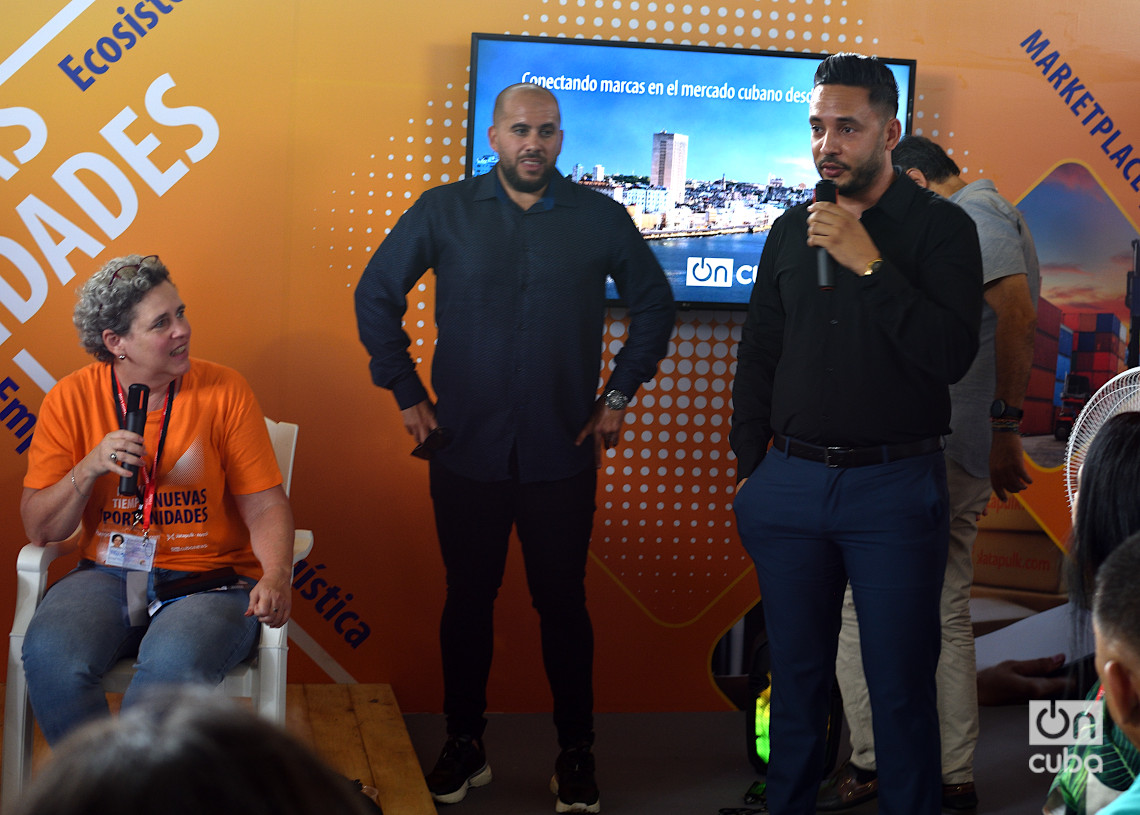Amidst gaps, regulatory dispersion and a low business culture, many Cuban entrepreneurs engage in bad practices in their businesses; something that, in some cases, can lead them to failure or to make mistakes of incalculable magnitude.
How to avoid them and how to share knowledge was discussed in the panel I tell you what I know. Entrepreneurs create networks through OnCuba, which took place at the stand shared by Fuego Enterprises Inc., Katapulk, and OnCuba News, during the 40th edition of the Havana International Fair, which was suspended prematurely last week.
The day before Hurricane Rafael left its trail of destruction across the western part of the country, we had the opportunity to hold this discussion with the participation of young entrepreneurs Mariam Rodríguez, leader of Petra, a business focused on intellectual property and trademark registration, and Carlos Arce, a computer scientist by training who today works as a professor, master in business management and marketing consultant, and who promotes a project in this area.
Mariam Rodríguez is the author of a series of four articles, under the title “De la idea al derecho: Propiedad Intelectual para emprendedores” (From the idea to the right: Intellectual Property for entrepreneurs) that OnCuba published between June and July of this year.
Later, the series “Branding en cuatro tiempos: Guía mínima sobre identidad de marca” (Branding in four steps: Minimum guide to brand identity) was launched, under the authorship of the designer, communicator, and content creator Betina Díaz.
In the coming weeks, Carlos Arce will be joining these installments with a special on the foundations of marketing focused on the needs of the Cuban context.
Each of these and other special collaborations is aimed at the protagonists of the island’s private sector, to contribute to their ongoing training, to expand their knowledge and possibilities to face the many challenges they must get around.
OnCuba, which aspires to welcome these and many other entrepreneurs in its pages, becomes a promoter and collaborator of this entrepreneurial network that continues to grow throughout the country and that constitutes one of the greatest opportunities for the nation.
This was explained by the editorial director, Milena Recio, who moderated this dialogue in which members of the public also participated.
De la idea al derecho: Propiedad Intelectual para emprendedores
OnCuba offers itself as a “home for this to-ing and fro-ing of knowledge,” Recio explained. “All entrepreneurs can become educators of others; whoever knows something and wants to share it, can do so from here.”
“The different areas of expertise are necessary to continue evolving the business culture of everyone. It is also an opportunity for entrepreneurs to make their own projects known through our platform,” she added.
Branding en cuatro tiempos: Guía mínima sobre identidad de marca
Regulatory dispersion
In her speech, Master of Science Mariam Rodríguez regretted that there is a lot of “regulatory dispersion” and “a great lack of legal and business culture” within the island’s private sector.
This is a disadvantage that is explained by the lack of experience of entrepreneurs at the head of small businesses, a process that only officially started in 2021 based on an almost non-existent business culture in a country with more than half a century of nationalization of its economy.
“There are regulations that are being modified more and more every day and I myself, who am a lawyer, am often struggling to find new information and be able to interpret them,” Rodríguez acknowledged.
The expert even said that the legislators themselves who design the regulatory frameworks are “at the crossroads of how to legislate based on a practice that they do not have.”

Intellectual property
For the expert in the legal intricacies related to intellectual property issues, one of the keys to success lies in mastering the keys to this area, a pending subject in most businesses.
“I am a staunch defender of intellectual property because if used well it can help MSMEs achieve business success,” she said.
To support her thesis, she cited a 2021 study by the European Union, which showed that 67% of European SMEs that have intellectual property rights in their company have achieved greater growth and income.
Another important point is networking; real, not just rhetorical.
“Knowledge must be socialized,” demanded Rodríguez, who recognizes the emergence of numerous work, advice and support networks, but still in insufficient numbers.

For Carlos Arce, there are three key elements to not fail. One is the financial area. “There is a need to know how to work on the subject of finance, beyond basic accounting, and to know how to take advantage of the financial tools that exist for benefits and contractual relationships,” he strongly recommended.
Arce considered that another of the axes is investments in the private sector. “Today, talking about investments in the private sector is perhaps marginal, because we do not have all the mechanisms approved to receive investments, even with the bank; or through foreign investment; or within our own environment: that is, between economic actors, who can make investments and such.”
Third key: knowing the logistics issue, how the value and supply chains work, and in which of these links the entrepreneur’s role and responsibility fit.
According to Arce, initiatives such as Cubaemprende, from the Archbishopric of Havana, and the workshops given at the Loyola Center, both managed by the Catholic Church, as well as the University of Havana and the 999+ Local Development project, bring the private sector closer to a state of articulation of business knowledge in today’s Cuba, where more than 11,000 MSMEs are changing the economic face of the country.
The expert told how the actions taken in this field in Asian nations such as Japan, China or Vietnam seemed like a dream for Cuba, as he learned about them during an event in Havana with Japanese advisors.

Integration of economic actors
“He told me: ‘But we can apply that in Cuba. What are we missing?’ And when we visualized what we were missing was the integration between the public and private sectors for a common interest,” Arce explained.
According to the specialist, on the island, there is a unique business sector, made up of state and private enterprises, which barely overlap with each other or with foreign capital.
“We can create joint ventures, cooperative production contracts, of which there are hardly any experiences today,” he advanced for a future scenario.
Regarding his specialty, marketing, Arce emphasized that it is necessary to understand the importance of this discipline beyond “a communication and publication action that generates an expense.”

Bad practices. A guide
Mariam Rodríguez, who does not like to say “non-state actors” but “private enterprises,” because “it’s the right way,” presented a list of bad practices in her talk. They are not all listed but are the most common and harmful for entrepreneurs.
The start of businesses and the launch of products and services to the market without having registered the brands and, much worse, without verifying that it can be a brand or trade name that can be registered as such, is one of the frequent errors, according to the guide of mistakes that Rodríguez shared during the conversation.
“It can create problems, such as a lawsuit for violation of the intellectual property rights of third parties,” she warned.
On the other hand, in her catalog of warnings, the specialist warned that “a brand cannot be descriptive or generic, or that it leads to errors in consumers.” In addition, she said, before starting any business, the interested party “has to verify that it is protectable, that the right to the brand can be held.”
She added that the new regulations establish that trade names cannot have words in English, “unless it is registered as an intellectual property right.”

Another bad practice has to do with co-ownership agreements, in people and enterprises. “If they do not sign said agreement, it is a problem; and if there is a future separation, what will that situation be like?” the expert asked.
Added to the common errors are the bylaws and poor information regarding intellectual property; the signing of contracts that are not made, and the intellectual property that is requested in the name of the partners of the MSME, when its use falls only on the MSME.
Rodríguez also cited, as a pernicious practice, the import of third-party products by private enterprises that do not produce them.
“They are registering the brands of these products as an exclusivity in the market and the intellectual property law says that if you have rights over this brand, you can prohibit its use by third parties,” she said.
According to Rodriguez, “this problem is creating a brake on the economy, because in bad faith someone wants to have a monopoly on marketing in Cuba.”

“It is also a frequent fault to export without registering patents abroad and without verifying that its export does not violate the rights of third parties,” she said and indicated that the product should be previously registered in the markets in case a brand pirate does his thing and files a lawsuit for brand usurpation.
And finally, the trade legislation expert warned: entrepreneurs who export have to know which words would be offensive in a lexigraph context that, although Hispanic American, is different from the Cuban one in some terms.
“There is a very well-known case in Cuba which is that of Conchita, the guava brand.… When they went to export the sweet to a country in the southern cone of America, the term Conchita has a negative connotation (diminutive of vulva or female genital) and they had to make a nominal change in order to enter the market,” Rodríguez narrated.










